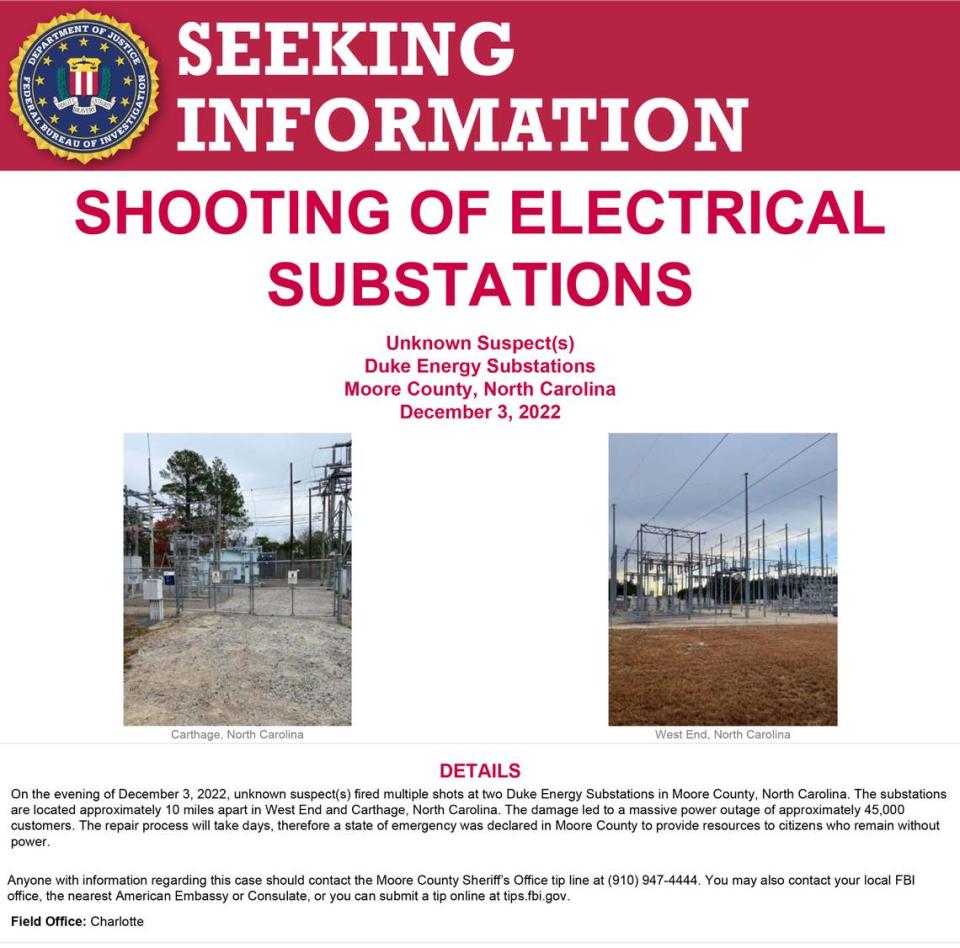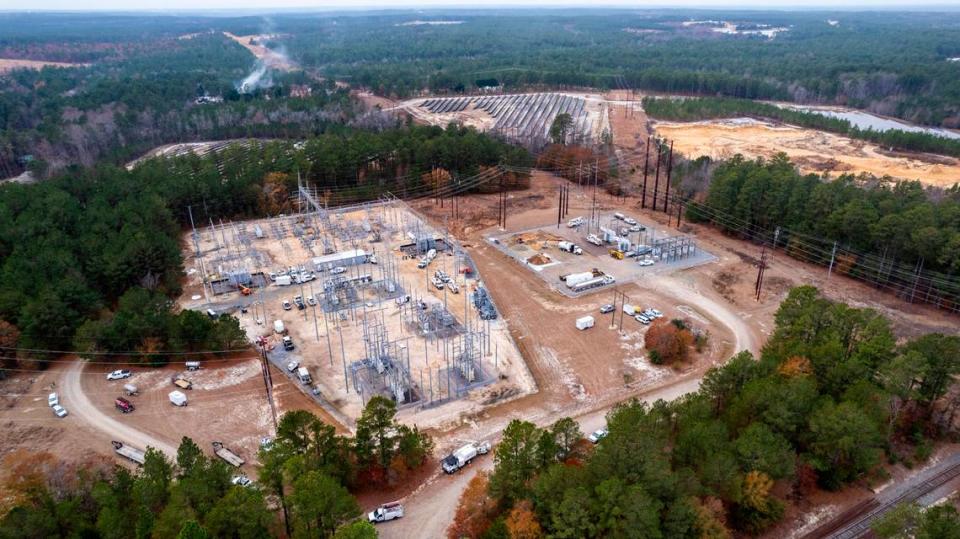Leads scarce in Moore County substation attacks, as stiffer penalties are under debate
Three months after attacks on two electric transmission substations took out the power in much of Moore County for four days, investigators still are trying to piece together any leads that might bring them closer to an arrest.
Progress appears slow and is hampered by a lack of evidence for investigators with the Moore County Sheriff’s Office, the State Bureau of Investigation and the FBI. Officials have declined to discuss their work in detail, saying they don’t want to jeopardize the investigation.
Part of the delay, law enforcement officials say, has come from Duke Energy itself, which they say has stalled on providing some documentation to detectives. Investigators had to get a court order forcing Duke to release certain personnel records, said Moore County Sheriff Ronnie Fields.
“Mainly what we were looking at was trying to get some personnel records and other records, such as people they might have had trouble with, terminated employees and things of that nature,” Fields said.
“Everything I get, I have to get a court order to get it,” he said. “That’s understandable. Do I like that? No, I don’t, it just puts a lot of pressure on a lot of things. That’s the way they’re going to play ball, and that’s the way we’re going to have to play.”
According to Duke Energy spokesperson Jeff Brooks, the utility company followed its process whenever personnel information is requested.
“It’s just to protect the privacy of information,” he said.
As the investigation stretches on, the Moore County Sheriff’s Office still has a dedicated group of investigators on the case.
“I have designated a team to work with this,” Fields said. “That team is working with the federal folks and the state folks together trying to formulate and do as much as we possibly can to gather information. We’ve not stopped, and the FBI has not stopped.”
Hate groups investigated
Those investigators continue to do interviews and follow tips that come in. Speculation has run far and wide that the Dec. 3 shootings at substations in West End and Carthage were the work of a white nationalist organization or some other hate group, especially after two white nationalist banners spewing hate messages were hung from U.S. 1 overpasses on Dec. 18 and Dec. 25.
However, no such groups have been connected to the attacks, Fields said.
The Sheriff’s Office confiscated the banners and is waiting on the SBI crime lab for any DNA results.
“The white supremacy group, we’re still waiting on the lab to send some of that information. That takes time,” Fields said. “We’re still looking at the Proud Boys group; there’s a whole lot of groups we’re looking at.”

Making faster progress is legislation in the N.C. General Assembly that would increase the penalties for those convicted of future attacks. And lawmakers continue to question Duke Energy concerning overall security for their vast network.
According to a report last month by WSOC-TV in Charlotte, the FBI issued search warrants asking Google to supply any data that can identify known cell phone users within a certain area during a specific window of time. Search warrants also were issued to mobile phone service providers T-Mobile, AT&T and Verizon.
Increasing penalties and protections
As the investigation continues, a bill that seeks to make substations less vulnerable to sabotage has stalled in the General Assembly.
Filed in January by State Rep. Ben Moss, House Bill 21 would require power companies to “provide security systems at substations to protect against vandalism and other security threats.” Companies also would be required to “continuously operate the security systems 24 hours a day.”
Since the attack, Duke Energy has posted cameras at its West End and Carthage substations, as well as several others. Officials have also said they’re working on a plan to “harden” such facilities from future attacks.
The proposed legislation passed an initial reading on Jan. 30. It was then referred to the House Committee on Energy and Public Utilities, which has yet to schedule a hearing.
“Right now it’s just sitting there waiting to be heard in committees,” said Moss, whose district includes Moore and Richmond counties. “It’s frustrating.”

Despite the slow progress, Moss said the bill has been received favorably by his fellow lawmakers and constituents. The measure has bipartisan support from more than 20 sponsors.
“The bill makes perfect sense and a lot of people have taken an interest in it,” Moss said. “I still get emails (about it) from people all throughout the United States. Actually, a lady just left my office who wanted to come in and talk about the bill. I’m staying positive and hoping it will make it through the committee process.”
In a previous interview with The Pilot, Moss said bullet-resistant fencing and security cameras could help deter would-be vandals. Cameras were not in place at either of the two substations attacked in Moore County.
Fields said the facilities’ lack of security systems has made the criminal investigation all the more difficult.
Another Republican lawmaker representing Moore County is involved with a separate bill filed in response to the attacks.
State Sen. Tom McInnis, a Pinehurst resident, is one of the primary sponsors of Senate Bill 58, which would strengthen penalties for people convicted of intentionally damaging the property of a public utility, including energy companies but also those involved in providing phone, broadband or cable service. The proposal is moving along faster than House Bill 21, having already cleared multiple committees in the Senate.
Under McInnis’ bill, those convicted of an attack on critical infrastructure would face increased prison time and a fine up to $250,000.
“What we have now doesn’t carry a lot of charges, or punishment if you will, or fines,” Fields said. “Sen. McInnis’ bill is going to increase that. Some of these are misdemeanor crimes, trespassing stuff, and he wants to strengthen some of them to felonies. The damage to the infrastructure will be felony charges, and it needs to be.”
Moss said he supports the Senate bill, but believes additional measures should be taken.
“It’s a little bit easier of a sale in my mind versus strengthening security measures,” he said. “I don’t disagree that the penalties need to be increased, but more needs to be done. Increasing penalties is not going to solve this issue.”
He added: “The main focus of my energy is protecting our energy.”

